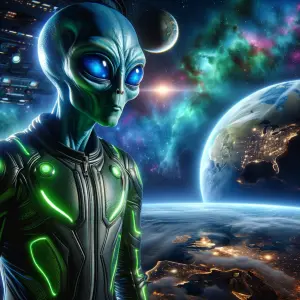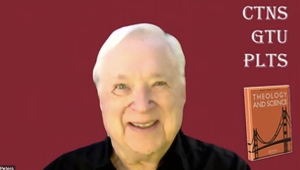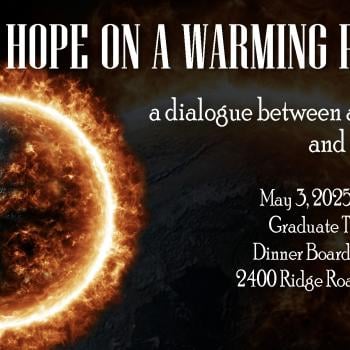The Cosmic Common Good
 A cosmic common good? Really? Isn’t a global common good good enough? After all, our ethicists are working night ‘n’ day to persuade earthlings to think holistically about the sustainability of the ecosphere! This is no mean task.
A cosmic common good? Really? Isn’t a global common good good enough? After all, our ethicists are working night ‘n’ day to persuade earthlings to think holistically about the sustainability of the ecosphere! This is no mean task.
The Cosmic Common Good of Daniel Sheid
So we ask: isn’t a global common good big enough? Why consider a cosmic common good that includes the entire cosmos?

Let’s ask Daniel P. Sheid. Professor Sheid teaches theology and ethics at Duquesne University. He’s written a book we should take note of: The Cosmic Common Good: Religious Grounds for Ecological Ethics. By “religious,” Sheid intends to construct an “interreligious cosmic common good” (Sheid 2015, xiii, 180).
We Homo sapiens share our planet with nonhuman realities. And we should appreciate this more than we do. We should conceive of the common good as including both the human and the extra-human. Sheid enjoins us to construct “a worldview that experiences the nonhuman or more than human world as the fullest setting for human life, and experiences the vitiation of the nonhuman world as a loss for the greater community of which we are a part” (Sheid 2015, xiv). We need to construct a non-anthropocentric worldview that sees humanity as part of a larger whole. Religious practices in various traditions should all aim at the one cosmic common good. Here on Earth, the common good includes the entire human race, to be sure. But it also includes whales, robins, and roses.
Curiously, Sheid shows reluctance to embrace a cosmic common good that we earthlings might share in common with off-Earth biospheres. Rather than ask about the welfare of space neighbors on exoplanets we have yet to meet, Sheid “exhorts us” on Earth to…
“…sink our roots deeper into our native place and to work for the good of our place on Earth. The cosmic common good enjoins us to adopt and intensify the many Earth-oriented personal daily choices and movements for structural change with which we are already familiar, for example reducing consumption and energy use, eating less or no meat, minimizing our dependence on automobiles, enforcing standards to reduce carbon in the atmosphere to below 350 parts per million” (Sheid 2015, 181).
The Cosmic Common Good of John Hart

For John Hart, an emeritus professor of theology at Boston University, the cosmic common good actually includes the entire cosmos. Hart is concerned that we on Earth think about the welfare of any neighbors we might meet in outer space. In 2010, Hart introduced the term, cosmic commons (Hart, Cosmic Commons: Contact and Community 2010). In 2020, Hart told us that we approach the cosmic commons with socioecological praxis ethics.
“Socioecological praxis ethics, in brief, is the integration of social justice within and among human communities, with the wellbeing of Earth and all living beings….In a universe or multiverse context, it becomes cosmosociological praxis ethics” (Hart, Third Displacement: Cosmobiology, Cosmolocality, and Cosmoecology 2020, 8n).
But more than Earth is included in Hart’s cosmic common good. So also is microbial life and even intelligent life living on an exoplanet.
“Cosmosocioecological praxis ethics might be extended now to cosmos contexts: at first as a working hypothesis, but then to be used in context upon discovery of ExoEarth microbial life, evolving life, or intelligent life” (Hart, Third Displacement: Cosmobiology, Cosmolocality, and Cosmoecology 2020, 205).
Cosmoethics, says Hart, “goes beyond-literally-astroethics” because cosmoethics takes account of off-Earth dimensions not yet encountered” (Hart, Third Displacement: Cosmobiology, Cosmolocality, and Cosmoecology 2020, 17, 236).
Now, you might object to Hart. As long as we do not know about extraterrestrial life and have no interaction, then we are not morally responsible for ET’s welfare. Because we share a biosphere on Earth with whales, robins, and roses, we can reasonably understand terrestrial ecological ethics. But not extraterrestrial ethics.
The Cosmic Common Good within an Extraterrestrial Worldview
A geocentric worldview went out with Copernicus. We now know too much about our universe. We can now discern a connectedness between Earth and what lies beyond Earth. For example, the sun pumps energy into our planet’s ecosphere twenty-four hours per day. Because of reverse entropy, this ever-increasing energy input accounts not just for survival but also our creativity and evolutionary advance. We terrestrials are as dependent on the extraterrestrial sun as we are on oxygen and rain clouds.
We on Earth are not dependent on plants or animals living on K2-18b 124 light years away. Yet, we share a cosmos with them. Might there come a day when we terrestrials will also share moral responsibilities with them? With this possibility in mind, we need now to construct a worldview with a genuinely cosmic common good in mind.
Conclusion
In a previous Patheos post, “Public Theology for the Common Good,” I began worldview construction on a foundational definition: public theology is conceived in the church, critically refined in the academy, and offered to the wider culture for the sake of the common good (Peters, The Voice of Public Theology 2023, 3). Discourse clarification and worldview construction provide the building tools. I reiterated that public theology is not a disguised form of evangelization or an attempt to usurp the public square for religious influence. Rather, public theology lifts up sound reasons for every person of good will to embrace a global common good.
In this post I have asked: how should we reason soundly about the cosmic common good? I compared Daniel Sheid with John Hart. Sheid is right in seeking common ground among the world’s religions for constructing an ecological ethic based upon the cosmic common good. Hart would agree. But Hart would spread the scope of the cosmic common good to include friends we have yet to meet on K2-18b along with any other extraterrestrials who share our universe with us.
Elsewhere I’ve recommended that we prepare in advance invitations to be issued to our expected space neighbors to attend a covered dish potluck in our church basement.
Patheos PT 3018 The Cosmic Common Good
Patheos PT 3001 Eco-Theology when it’s “Time to Act”
Patheos PT 3002 The Science-As-Savior Eco-Myth
Patheos PT 3003 Public Theology for the Common Good
Patheos PT 3011 Politics vs Common Good Governing Part One
Patheos PT 3012 Economism vs Common Good Part Two
Patheos PT 3013 Economism vs Common Good Part Three
Patheos PT 3014 Economism vs Common Good Part Four
Patheos PT 3015 Just, Sustainable, Participatory, and Planetary. Common Good Part Five
Patheos PT 3016 Moltmann, Muslims and Al-Mizan: Common Good Part Six
Patheos PT 3017 Climate Change and the Global Common Good
Patheos PT 3018 The Cosmic Common Good
▓

Ted Peters pursues Public Theology at the intersection of science, religion, ethics, and public policy. Peters is an emeritus professor at the Graduate Theological Union, where he co-edits the journal, Theology and Science, on behalf of the Center for Theology and the Natural Sciences, in Berkeley, California, USA. His book, God in Cosmic History, traces the rise of the Axial religions 2500 years ago. He previously authored Playing God? Genetic Determinism and Human Freedom? (Routledge, 2nd ed., 2002) as well as Science, Theology, and Ethics (Ashgate 2003). He is editor of AI and IA: Utopia or Extinction? (ATF 2019). Along with Arvin Gouw and Brian Patrick Green, he co-edited the new book, Religious Transhumanism and Its Critics hot off the press (Roman and Littlefield/Lexington, 2022). He has recently published The Voice of Public Theology (ATF 2023). See his Substack column on The Voice of Public Theology as well as his website: TedsTimelyTake.com.
[▓References
Hart, John. 2010. “Cosmic Commons: Contact and Community.” Theology and Science 8 (4): 371-392.
—. 2020. Third Displacement: Cosmobiology, Cosmolocality, and Cosmoecology. Eugene OR: Cascade Books.
Peters, Ted. 2023. The Voice of Public Theology. Adelaide: ATF.
Sheid, Daniel. 2015. The Cosmic Common Good: Religious Grounds for Ecological Ethics. Oxford: Oxford University Press.














